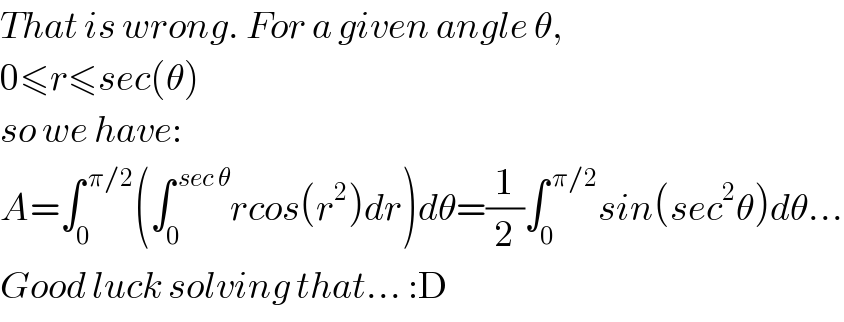
Question Number 41346 by maxmathsup by imad last updated on 05/Aug/18
![calculate ∫∫_([0,1]^2 ) cos(x^2 +y^2 )dxdy .](Q41346.png)
$${calculate}\:\int\int_{\left[\mathrm{0},\mathrm{1}\right]^{\mathrm{2}} } \:{cos}\left({x}^{\mathrm{2}} \:+{y}^{\mathrm{2}} \right){dxdy}\:. \\ $$
Commented by alex041103 last updated on 06/Aug/18
![What does [0,1]^2 mean?](Q41372.png)
$${What}\:{does}\:\left[\mathrm{0},\mathrm{1}\right]^{\mathrm{2}} \:{mean}? \\ $$
Commented by math khazana by abdo last updated on 07/Aug/18
![that mean [0,1]×[0,1]](Q41412.png)
$${that}\:{mean}\:\:\left[\mathrm{0},\mathrm{1}\right]×\left[\mathrm{0},\mathrm{1}\right] \\ $$
Commented by alex041103 last updated on 07/Aug/18
![OK. But what does it means as a reagon? I′m asking what is the reagon which is defined by [0,1]^2 or [0,1]×[0,1]](Q41425.png)
$${OK}.\:{But}\:{what}\:{does}\:{it}\:{means}\:{as}\:{a}\:{reagon}? \\ $$$${I}'{m}\:{asking}\:{what}\:{is}\:{the}\:{reagon}\:{which} \\ $$$${is}\:{defined}\:{by}\:\left[\mathrm{0},\mathrm{1}\right]^{\mathrm{2}} \:{or}\:\left[\mathrm{0},\mathrm{1}\right]×\left[\mathrm{0},\mathrm{1}\right] \\ $$$$ \\ $$
Commented by MrW3 last updated on 08/Aug/18

$$\mathrm{0}\leqslant{x}\leqslant\mathrm{1} \\ $$$$\mathrm{0}\leqslant{y}\leqslant\mathrm{1} \\ $$
Commented by maxmathsup by imad last updated on 08/Aug/18
![let A = ∫∫_([0,1]^2 ) cos(x^2 +y^2 )dxdy changement x =rcosθ and y=rsinθ A =∫∫_w cos(r^2 )rdrdθ let find w we have 0≤x≤1 and 0≤y≤1 ⇒ 0≤x^2 +y^2 ≤2 ⇒ 0<r≤(√2) and 0≤θ≤(π/2) A = ∫_0 ^(π/2) ( ∫_0 ^(√2) r cos(r^2 )dr)dθ =(π/2) [(1/2)sin(r^2 )]_0 ^(√2) =(π/4){sin(2)} ⇒ A =((π sin(2))/4) .](Q41498.png)
$${let}\:{A}\:=\:\int\int_{\left[\mathrm{0},\mathrm{1}\right]^{\mathrm{2}} } \:\:\:{cos}\left({x}^{\mathrm{2}} +{y}^{\mathrm{2}} \right){dxdy}\:\:{changement}\:{x}\:={rcos}\theta\:{and}\:{y}={rsin}\theta \\ $$$${A}\:=\int\int_{{w}} {cos}\left({r}^{\mathrm{2}} \right){rdrd}\theta\:\:\:\:{let}\:{find}\:{w} \\ $$$${we}\:{have}\:\:\mathrm{0}\leqslant{x}\leqslant\mathrm{1}\:{and}\:\:\mathrm{0}\leqslant{y}\leqslant\mathrm{1}\:\:\Rightarrow\:\mathrm{0}\leqslant{x}^{\mathrm{2}} \:+{y}^{\mathrm{2}} \leqslant\mathrm{2}\:\Rightarrow\:\mathrm{0}<{r}\leqslant\sqrt{\mathrm{2}}\:\:\:{and}\:\:\mathrm{0}\leqslant\theta\leqslant\frac{\pi}{\mathrm{2}} \\ $$$${A}\:\:=\:\int_{\mathrm{0}} ^{\frac{\pi}{\mathrm{2}}} \:\left(\:\int_{\mathrm{0}} ^{\sqrt{\mathrm{2}}} \:{r}\:{cos}\left({r}^{\mathrm{2}} \right){dr}\right){d}\theta\:\:=\frac{\pi}{\mathrm{2}}\:\left[\frac{\mathrm{1}}{\mathrm{2}}{sin}\left({r}^{\mathrm{2}} \right)\right]_{\mathrm{0}} ^{\sqrt{\mathrm{2}}} \\ $$$$=\frac{\pi}{\mathrm{4}}\left\{{sin}\left(\mathrm{2}\right)\right\}\:\Rightarrow\:{A}\:=\frac{\pi\:{sin}\left(\mathrm{2}\right)}{\mathrm{4}}\:. \\ $$
Commented by alex041103 last updated on 09/Aug/18

$${That}\:{is}\:{wrong}.\:{For}\:{a}\:{given}\:{angle}\:\theta, \\ $$$$\mathrm{0}\leqslant{r}\leqslant{sec}\left(\theta\right) \\ $$$${so}\:{we}\:{have}: \\ $$$${A}=\int_{\mathrm{0}} ^{\:\pi/\mathrm{2}} \left(\int_{\mathrm{0}} ^{\:{sec}\:\theta} {rcos}\left({r}^{\mathrm{2}} \right){dr}\right){d}\theta=\frac{\mathrm{1}}{\mathrm{2}}\int_{\mathrm{0}} ^{\:\pi/\mathrm{2}} {sin}\left({sec}^{\mathrm{2}} \theta\right){d}\theta... \\ $$$${Good}\:{luck}\:{solving}\:{that}...\::\mathrm{D} \\ $$
